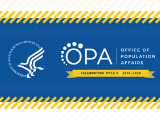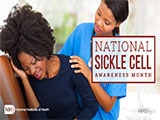Improving Access to Care in Sickle Cell Disease

I have lived with sickle cell disease for 48 years. The toll it takes goes far beyond pain – it has impacted me emotionally, economically, and psychosocially. I missed childhood activities because I was too sick or tired. I missed school days and worked harder to catch up on missed assignments. I learned to live with sickle cell disease, but it still impacted my ambitions. I wanted to join the Air Force and serve my country, but those dreams were dashed when a recruiter in high school told me I could not join. So, instead, I committed myself to finding a cure and helping others suffering from it.
But as I started college, I became sick and missed weeks of classes. Then, in my junior year, I developed acute chest syndrome, a condition characterized by chest pain, cough, fever, and hypoxia that can result in death. A hematologist recommended using hydroxyurea, which makes red blood cells more flexible and is the only effective drug proven to reduce the frequency of painful episodes.
After starting on hydroxyurea, I went from having four or five crises a year to not having a crisis for years. I went from just getting by to making the Dean’s List every semester in my last two years of college. I became the first in my family to graduate from a four-year university, and I did it with a double major in Zoology and Microbiology.
I moved on to medical school. During my hematology rotation in the first year of residency, I realized the barriers sickle cell patients face in accessing healthcare and benefiting from advancements in medicine. Hydroxyurea is FDA approved and available, yet many sickle cell patients do not take it. To address the barriers that sickle cell patients face in receiving optimal care, I decided to pursue a public health career.
Now, at the Health Resources and Services Administration’s (HRSA) Sickle Cell Disease Treatment Demonstration Program (SCDTDP), I work with talented people to address the barriers that keep people with sickle cell disease from receiving treatments.
SCDTDP uses the Chronic Care Model approach, which aims to inform patients of treatments so they become active participants in their care and prepare healthcare professionals so they can inform patients in a more productive interaction. This interaction improves outcomes for the patient and reduces cost for the healthcare system.
Project ECHO, a program that uses telementoring to connect local clinicians to experts from sickle cell centers, and allows hematologists to share knowledge with primary care providers, increases awareness for the effectiveness of giving hydroxyurea to patients. HRSA currently funds five regional Project ECHO grantees to develop regional and state networks. The five regional grantees – in the Northeast Region (Johns Hopkins); Southeast Region (Charlotte Mecklenburg Hospital); Midwest Region (Cincinnati Children’s Hospital); Heartland and Southwest Region (Washington University) and Pacific Region (Center for Inherited Blood Disorders) – work with sickle cell providers in 43 states on strategies to improve access to care.
The HRSA-funded Sickle Cell Disease Newborn Screening Program works with Community-based Organizations (CBOs) to enhance outreach and education to individuals with sickle cell disease by using Community Health Workers (CHWs). The CBOs serve as a resource to help patients link to medical services, obtain care coordination, and address other social issues that present barriers to receiving optimal care. CHWs help people access quality care, especially those who wouldn’t otherwise receive it. It is not enough to help individuals with sickle cell disease reach adulthood – we must find strategies that support them through their entire life course.
I am fortunate that I have found a way to serve my country – not in the military, but as a civil servant. I still live with sickle cell disease, but I am excited about the new therapies moving us closer to a cure. Our goal is to ensure everyone benefits from these new therapies. I have experienced the benefits myself. Nothing is more important than giving others the same chance for a healthy future.
Ignored No More: Reimagining Primary Health Care
Everyone Plays a Role in Improving Immunization Rates and Prevent


